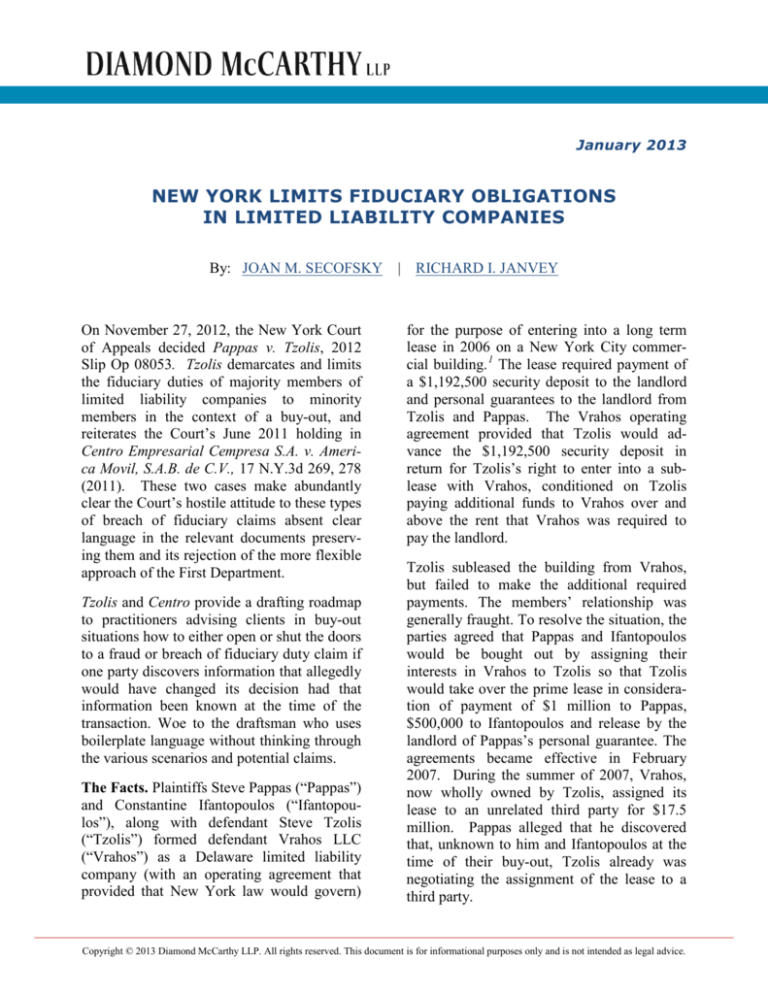
January 2013
NEW YORK LIMITS FIDUCIARY OBLIGATIONS
IN LIMITED LIABILITY COMPANIES
By: JOAN M. SECOFSKY
On November 27, 2012, the New York Court
of Appeals decided Pappas v. Tzolis, 2012
Slip Op 08053. Tzolis demarcates and limits
the fiduciary duties of majority members of
limited liability companies to minority
members in the context of a buy-out, and
reiterates the Court’s June 2011 holding in
Centro Empresarial Cempresa S.A. v. America Movil, S.A.B. de C.V., 17 N.Y.3d 269, 278
(2011). These two cases make abundantly
clear the Court’s hostile attitude to these types
of breach of fiduciary claims absent clear
language in the relevant documents preserving them and its rejection of the more flexible
approach of the First Department.
Tzolis and Centro provide a drafting roadmap
to practitioners advising clients in buy-out
situations how to either open or shut the doors
to a fraud or breach of fiduciary duty claim if
one party discovers information that allegedly
would have changed its decision had that
information been known at the time of the
transaction. Woe to the draftsman who uses
boilerplate language without thinking through
the various scenarios and potential claims.
The Facts. Plaintiffs Steve Pappas (“Pappas”)
and Constantine Ifantopoulos (“Ifantopoulos”), along with defendant Steve Tzolis
(“Tzolis”) formed defendant Vrahos LLC
(“Vrahos”) as a Delaware limited liability
company (with an operating agreement that
provided that New York law would govern)
| RICHARD I. JANVEY
for the purpose of entering into a long term
lease in 2006 on a New York City commercial building. 1 The lease required payment of
a $1,192,500 security deposit to the landlord
and personal guarantees to the landlord from
Tzolis and Pappas. The Vrahos operating
agreement provided that Tzolis would advance the $1,192,500 security deposit in
return for Tzolis’s right to enter into a sublease with Vrahos, conditioned on Tzolis
paying additional funds to Vrahos over and
above the rent that Vrahos was required to
pay the landlord.
Tzolis subleased the building from Vrahos,
but failed to make the additional required
payments. The members’ relationship was
generally fraught. To resolve the situation, the
parties agreed that Pappas and Ifantopoulos
would be bought out by assigning their
interests in Vrahos to Tzolis so that Tzolis
would take over the prime lease in consideration of payment of $1 million to Pappas,
$500,000 to Ifantopoulos and release by the
landlord of Pappas’s personal guarantee. The
agreements became effective in February
2007. During the summer of 2007, Vrahos,
now wholly owned by Tzolis, assigned its
lease to an unrelated third party for $17.5
million. Pappas alleged that he discovered
that, unknown to him and Ifantopoulos at the
time of their buy-out, Tzolis already was
negotiating the assignment of the lease to a
third party.
Copyright © 2013 Diamond McCarthy LLP. All rights reserved. This document is for informational purposes only and is not intended as legal advice.
New York’s Highest Court Limits Fiduciary Obligations
The Vrahos operating agreement provided in
Paragraph 11 that any member of Vrahos
“may engage in business ventures and investments of any nature whatsoever, whether
or not in competition with [Vrahos] without
obligation of any kind to [Vrahos] or to the
other members.” The assignment documents
for the buy-out contained an executed Certificate that also purported to eliminate any
fiduciary duty of Tzolis to the other two. The
Certificate provided that the plaintiffs/sellers
had “performed their own due diligence in
connection with [the] assignments . . . engaged [their] own legal counsel, and [were]
not relying on any representations by Steve
Tzolis or any of his agents or representatives,
except as set forth [in the documents] … and
agrees that Steve Tzolis has no fiduciary duty
to the undersigned Sellers in connection with
such assignments.”
The Complaint. Pappas and Ifantopoulos,
individually and on behalf of Vrahos, commenced an action against Tzolis and Vrahos
in Supreme Court New York County, Index
No. 601115/09, in 2009. 2
The complaint alleged ten causes of action
against Tzolis: breach of fiduciary duty,
misappropriation of a business opportunity of
Vrahos, breach of contract and of the implied
covenant of good faith and fair dealing,
conversion, unjust enrichment, rescission and
a declaratory judgment setting aside plaintiffs’ assignments and forfeiting Tzolis
interest in Vrahos, equitable accounting,
imposition of a constructive trust, tortious
interference and fraud and misrepresentation.
The final claim was brought derivatively and
asserted that Tzolis breached his fiduciary
duty to Vrahos.
The Motion to Dismiss. Prior to answering,
Tzolis moved to dismiss the complaint in its
entirety. In a March 2010 decision, Judicial
Hearing Officer Ira Gammerman held that
Paragraph 11 of the operating agreement
“eliminates the fiduciary relationship that
| page 2
would, otherwise, be owed by the members to
each other and to [Vrahos] …” He granted
the motion and dismissed the complaint.
The Intermediate Appeal. In a September
2011 three to two decision, the First Department reversed dismissal as to the breach of
fiduciary duty, conversion, unjust enrichment
and fraud and misrepresentation claims. 3 The
Court held, whether under New York or
Delaware law, that plaintiffs adequately
alleged that Tzolis breached a fiduciary duty
“to keep them informed of any and all opportunities” that he was pursuing on behalf of
Vrahos:
Paragraph 11 … may have permitted
Tzolis to pursue a business opportunity
unrelated to Vrahos, for his exclusive
benefit, without having to disclose it to
plaintiffs or otherwise present it first to
Vrahos. However, we find that the
provision does not “clearly” permit
Tzolis to engage in behavior such as
that alleged here, which was to surreptitiously engineer the lucrative sale of
the sole asset owned by Vrahos, without informing his fellow owners of that
entity. … we find that Tzolis failed to
meet his burden of establishing that the
provision extended that far.
As to the Certificate signed in connection
with the buy-out acknowledging that Tzolis
owed them no fiduciary duties, the court,
relying on its earlier decision in Blue Chip
Emerald v. Allied Partners, 299 A.D.2d 278
(1st Dep’t 2002), held that it was “compelled
to act with the same uncompromising rigidity” in finding that Tzolis “had an overriding
duty to disclose his dealing with [the third
party] to plaintiffs before they assigned their
interests” to him.
The dissent argued that Centro, supra,
required dismissal of the remaining claims.
The disclaimer in the Certificate, according to
the dissenters, “was tantamount to a release
Copyright © 2013 Diamond McCarthy LLP. All rights reserved. This document is for informational purposes only and is not intended as legal advice.
New York’s Highest Court Limits Fiduciary Obligations
from all claims against Tzolis in connection
with the assignment that were premised on his
fiduciary duty to plaintiffs.”
The Court of Appeals. The Appellate
Division granted Tzolis leave to appeal to the
Court of Appeals. The Court heard argument
October 17 and reversed on November 27,
2012. The unanimous and relatively brief
opinion relied extensively on its Centro
decision. The Court held:
Where a principal and fiduciary are
sophisticated entities and their relationship is not one of trust, the principal cannot reasonably rely on the fiduciary without making additional inquiry. … The test, in essence, is
whether, given the nature of the parties’ relationship at the time of the release, the principal is aware of information about the fiduciary that would
make reliance on the fiduciary unreasonable. … [P]laintiffs were in a position to make a reasoned judgment
about whether to agree to the sale of
their interests to Tzolis. The need to
use care to reach an independent assessment of the value of the lease
should have been obvious to plaintiffs,
given that Tzolis offered to buy their
interests for 20 times what they had
paid for them just a year earlier.
Because plaintiffs were sophisticated businesspeople represented by counsel and were
in a position to make a reasoned judgment
about whether to sell to Tzolis, and the
relationship among the members at the time
of the buy-out was already antagonistic,
reliance on Tzolis’s representations as a
fiduciary would not have been reasonable.
Therefore, the Court held the release contained in the Certificate was valid and dismissed the breach of fiduciary duty claim.
The Court also dismissed the fraud and
misrepresentation claim based on the Certifi-
| page 3
cate: “[W]hile it is true that a party that
releases a fraud claim may later challenge that
release as fraudulently induced it if alleges a
fraud separate from any contemplated by the
release, plaintiffs do not allege that the release
was itself induced by any action separate from
the alleged fraud consisting of Tzolis’s failure
to disclose his negotiations to sell the lease.” 4
The Centro Decision. Because the Court in
Tzolis essentially reiterated its decision in
Centro, it is worthwhile to revisit that case.
Plaintiffs were minority shareholders in a
closely held telecommunications company
indirectly owned by Mexican financier Carlos
Slim. Essentially, plaintiffs claimed that they
sold their minority interest for much less than
it was worth because defendants failed to
provide them with accurate tax and financial
statements and were unwilling to negotiate
with them in good faith. They sought damages in excess of $900 million.
The “Members Release” that plaintiffs in
Centro executed in connection with the sale
was extremely broad, releasing the buyers and
their agents from all actions “arising out of,
based upon, attributable to or resulting from
the ownership of membership interests in [the
entity] or having taken or failed to take any
action in any capacity on behalf of [the entity
or in connection with the entity’s business].” 5
Based on the Release, defendants unsuccessfully moved to dismiss the complaint before
answer.
On appeal, the First Department reversed in a
three to two decision based on the Release
and dismissed the case. Plaintiffs appealed to
the Court of Appeals which affirmed.
Preliminarily, the Court held that the broad
language of the Members Release “indicates
an intent to release defendants from fraud
claims, like this one, unknown at the time of
contract.” Therefore, plaintiffs were estopped
from arguing that defendants fraudulently
misled them regarding the value of their
Copyright © 2013 Diamond McCarthy LLP. All rights reserved. This document is for informational purposes only and is not intended as legal advice.
New York’s Highest Court Limits Fiduciary Obligations
ownership interests “unless the release was
itself induced by a separate fraud,” which
plaintiffs did not allege.
Although recognizing that the defendant
majority shareholder owed a fiduciary duty to
the plaintiff minority shareholders, “A
sophisticated principal is able to release its
fiduciary from claims—at least where, as
here, the fiduciary relationship is no longer
one of unquestioning trust—so long as the
principal understands that the fiduciary is
acting in its own interest and the release is
knowingly entered into.” The Court, referencing three earlier First Department decisions (including Blue Chip, supra, which the
First Department relied on in Tzolis), wrote
that to the extent those cases suggested that a
fiduciary has an obligation to come forward
and confess to all his wrongful acts to have a
valid, enforceable settlement, those cases
“misapprehend our case law.” Plaintiffs, “as
sophisticated entities, … negotiated and
executed an extraordinary broad release with
their eyes wide open. They cannot now
invalidate that release by claiming ignorance
of the depth of their fiduciary’s misconduct.”
In addition to failing to allege that the Members Release was induced by a separate fraud,
the Court further held that plaintiffs’ claims
were properly dismissed because they failed
to allege the standard fraud pleading requirement that they justifiably relied on defendants’ fraudulent statements in executing the
Members Release. While the Court agreed
that in certain (not described) circumstances,
| page 4
a fiduciary’s disclosure obligation might be
the equivalent of a written representation that
there were no undisclosed material facts,
“Where a principal and fiduciary are sophisticated parties engaged in negotiations to
terminate their relationship, however, the
principal cannot blindly trust the fiduciary’s
assertions. This is particularly true where, as
alleged here, the principal has actual
knowledge that its fiduciary is not being
entirely forthright.”
The Take-Away. All New York courts—
including federal courts interpreting parties’
obligations in transactions subject to New
York law—are constrained to follow the
Court of Appeals’ interpretation of fiduciary
obligations as set forth in Centro and Tzolis.
That means that the language in operating
agreements regarding fiduciary duties and
releases and the representations and warranties and release sections in purchase and sale
agreements or assignments must clearly set
forth exactly what are the fiduciary obligations, if any, between the parties, and what
will be the effect if one of the parties allegedly discovers a breach after the fact. Since in
the normal course, one side will want to close
off all remedies upon closing, and the other
will try to keep its options open, the scope of
these clauses may be the subject of intense
negotiation. But, it is no longer reasonable to
assume—if it ever was—that ambiguity in the
drafting combined with overreaching by the
majority will be interpreted in favor of the
minority.
Copyright © 2013 Diamond McCarthy LLP. All rights reserved. This document is for informational purposes only and is not intended as legal advice.
New York’s Highest Court Limits Fiduciary Obligations
| page 5
1
Interestingly, although the lower and intermediate courts stated that it was irrelevant to the decision
whether Delaware or New York law applied, the Court of Appeals never referenced the choice of law
issue.
2
In an unrelated case involving Steve Tzolis and a different limited liability company, Tzolis v. Wolff, 10
N.Y.3d 100 (2008), the Court of Appeals held that limited liability company members have the right to
bring derivative suits on behalf of the limited liability company, even though the applicable New York
law did not specifically authorize such suits; “We base our holding on the long-recognized importance
of the derivative suit in corporate law, and on the absence of evidence that the Legislature decided to
abolish this remedy when it passed the Limited Liability Company Law in 2009.”
3
As to the derivative count, the court held that plaintiffs had standing to assert the claim because their
assignments of their interests in Vrahos may be voidable, but the claim was correctly dismissed on the
merits, “since it was contradicted both by other allegations in the complaint and by the documentary
evidence, which shows that Vrahos received $17,500,000 from the assignment of its lease.”
4
The Court dismissed the remaining conversion and unjust enrichment claims because plaintiffs failed to
allege the elements of these common law claims. Because Tzolis had purchased plaintiffs’ interests in
Vrahos, he could not have interfered with their property rights. Because the doctrine of unjust enrichment only applies in the absence of an actual agreement, and the sale of Vrahos was based on both the
operating agreement and the documents relating to the sale, the unjust enrichment claim failed as a
matter of law.
5
The parties also signed a “Master Release” which provided that the “release shall not release any claims
involving fraud,” but the Court determined that the dispute at issue was governed by the Members
Release.
Richard I. Janvey, Partner, is a business advisor, mediator and litigator involved in commercial,
inter- and intra-company disputes and internal investigations. Richard has completed numerous
mediation programs, including the Program on Negotiation at Harvard Law School’s Mediation
Workshop. Rjanvey@diamondmccarthy.com
Joan M. Secofsky, Senior Counsel, focuses on corporate and securities litigation, arbitration and
mediation. Jsecofsky@diamondmccarthy.com
Both are based in the New York office:
DIAMOND MCCARTHY LLP
620 Eighth Avenue (between 40th & 41st Streets), 39th Floor, New York, NY 10018
Phone: (212) 430-5400 Fax: (212) 430-5499
Copyright © 2013 Diamond McCarthy LLP. All rights reserved. This document is for informational purposes only and is not intended as legal advice.



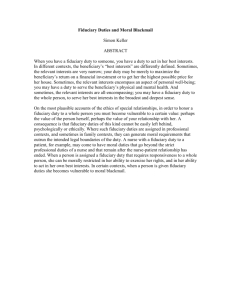
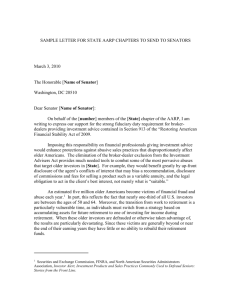
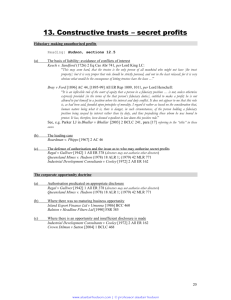
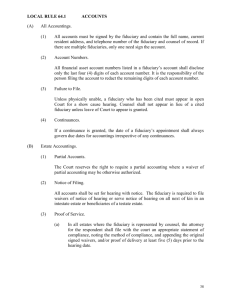
![Mark Whitenack Digital Assets PowerPoint Presentation []](http://s2.studylib.net/store/data/005383425_1-9cf830a5f2e9fc777daa963eb9460c8e-300x300.png)
